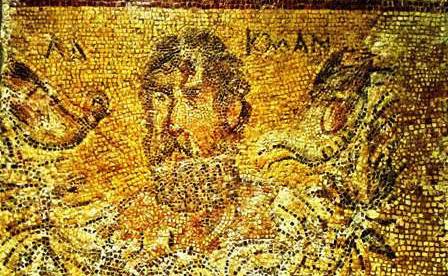Alkman – Lyric poet

The lyric poet Alkman (a Doric adaptation of the Ionic name Alkmaion or Alkmeon) lived during the 27th Olympiad (672-668 BC). According to ancient testimonies, he was born in Sardis in Lydia (Asia Minor) and then immigrated to Sparta. There are two versions of his arrival there. In the first, he was commanded by an oracle, while in the second, he was sold as a slave from Sardis. According to the "Suida Dictionary", he was a Lacedaemonian born in Messoa. He was the son of Damas or Titaros and one of the most important Greek lyric poets of antiquity.
In the middle of the 7th BC century, Alkman shaped "choral" poetry into a unique literary genre in Sparta. He not only composed the text of his poems but also determined the music, as well as their dance and mimetic movements. Alkman’s work is preserved in fragments and refers to love and the joys of life, describing the beauty of nature in a simple style. It is no coincidence, after all, that he is described as a man with a "particularly romantic mood" and as the "inventor of love poems". Alkman is presented as an educated man, and remarkably, his verses are full of geographical information. In fact, his text about the world sleeping after the end of the day is considered a unique example of Greek poetry and was imitated by Johann Wolfgang von Goethe in his work "The Night Song of Wanderers". The longest surviving fragments come from a Parthenium (a hymn sung by young virgins for worshipping purposes) intended to be sung by a Dance of ten maidens at a goddess’ festival (perhaps Artemis or Helen the Fair). In another passage, his reference to Dethnis wine (maybe the oldest wine with a designation of origin) produced in Denthaliatida Chora (today's Alagonia region in Mount Taygetos) is characteristic. As he characteristically mentions, this wine was a " wine of endless anthosmia (flower scent)". (Alkman par'Athinaios and Hesychios: I.31).
The lyric poet’s work has been classified into 6-7 books by the Alexandrians, which contained lyrical and choral chants, such as hymns, paeans (marches), scholia (a type of lyric poetry that was cultivated in Ancient Greece and was sung at official aristocratic banquets, to celebrate some important event) and Parthenia (ancient choral lyric songs). The language used by Alκman is mainly the Doric of his time, mixed with elements of the Ionic and Aeolic dialects. Τraveller Pausanias calls this language "not at all euphonic".
In 1855, French Egyptologist August Mariette discovered a papyrus with 100 verses belonging to one of Alkman’s Parthenia, "Eis Artemis Orthia", in a tomb near the second pyramid of Giza. The Parthenium originally consisted of 10-12 stanzas, of which only seven have survived. This text was first published by French professor Emile Egger in 1863.
In 1957, papyrus 2390 of Oxyrhynchus (a city in Lower Egypt where many papyri with mainly Greek texts bearing the name of the city and a code number were discovered in excavations) was published, which dates back to the 2nd century AD. In this papyrus, parts of a prose commentary are preserved where it is revealed that in one of his poems, he is dealing with a kind of theogonic cosmology! In particular, the lyric poet describes the birth of the Universe 27 whole centuries before what English physicist Stephen Hawking declared about quantum cosmology. This unique element was proven by four astrophysicists from the University of Athens, who connected Alkman’s cosmology with modern cosmological theories in their recent work. The paper is entitled: "A Pre-Socratic Cosmological Proposal" and was carried out by Manos Danezis, Efstratios Theodosiou, Theofanis Grammenos and Margiela Stathopoulos.
Alkman died in Sparta in about 612 BC. Traveller Pausanias mentions a monument dedicated to the lyric poet at the site of Chevrikon (east of Sparta).



